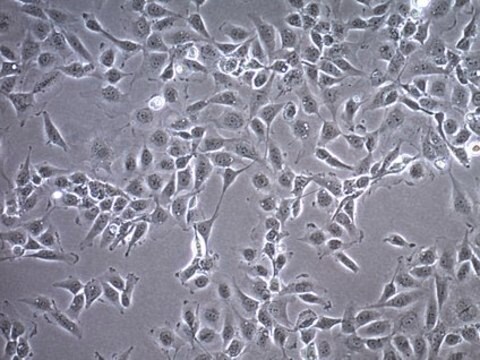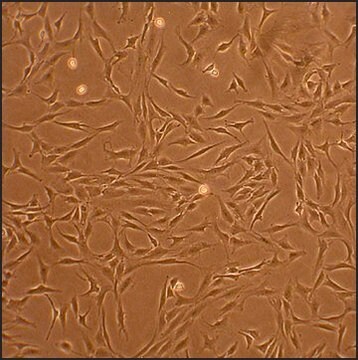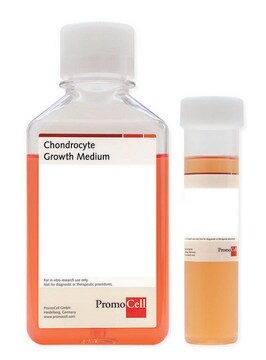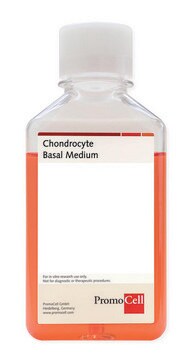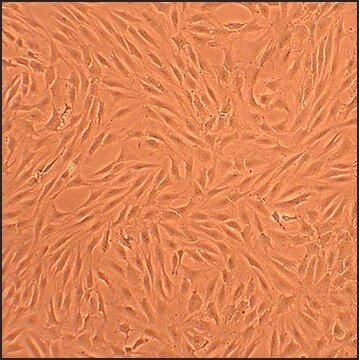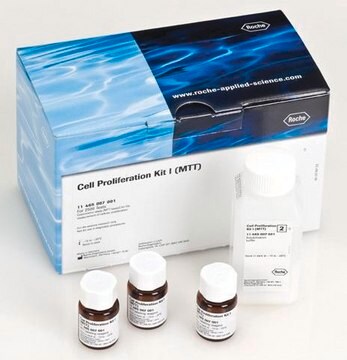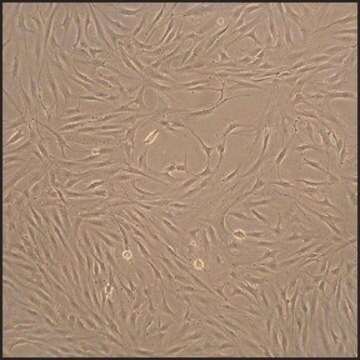402-05A
Human Chondrocytes: HC, adult
Synonym(s):
HC cells
About This Item
Recommended Products
biological source
human articular cartilage
Quality Level
packaging
pkg of 500,000 cells
manufacturer/tradename
Cell Applications, Inc
growth mode
Adherent
karyotype
2n = 46
morphology
chondrocyte
technique(s)
cell culture | mammalian: suitable
relevant disease(s)
arthritis
shipped in
dry ice
storage temp.
−196°C
General description
Human Chondrocytes, HC, are derived from normal human articular cartilage where they produce and maintain the extracellular matrix of cartilage, including type II collagen. Chondrocytes grown in monolayer culture on a solid surface tend to lose their phenotypic markers and became de-differentiated to a fibroblast-like phenotype. This de-differentiation stage can be reversed by culturing them in a semi-solid gel.
Normal Chondrocytes have been adapted as an in vitro model system in multiple studies looking for cellular mechanisms, such as inflammation-related signaling cascades, abnormal proteinase production, chondrocyte apoptosis and differentiation, as well as novel potential treatments for arthritic disease.
Characterization: Positive for aggrecan after differentiation.
Normal Human Chondrocytes (HC) have been used to:
- Develop a high throughput assay to screen for genes capable of inducing an OA-like phenotype in chondrocytes in order to identify key pathways implicated in the disease (Daouti, 2005)
- Elucidate the signaling cascade leading to induction of proinflammatory cytokines by chondrocytes in RA joints (Aida, 2006; Wang, 2011a,b) and effects of elevated IL-6 signaling on normal chondrocytes (Namba, 2007)
- Investigate mechanisms and identify inhibitors of increased production of proteinases by chondrocytes stimulated by interleukin-1 (Aida, 2005; Wada, 2006), retinoic acid (Hikichi, 2009), proinflammatory cytokines (Tanigawa, 2011a,b), nitric oxide (Wu, 2007; Yang, 2011) and shear stress (Wang, 2011b, 2012)
- Investigate the causes of metalloproteinases induction in patients with Lyme disease-associated arthritis (Lin, 2001; Behera, 2004, 2005)
- Study the factors affecting chondrocyte apoptosis (Cherng, 2008; Malemud, 2012) and differentiation into osteoclasts (Watanabe, 2009a,b; Honda, 2011)
- Show that hyaluronate (HA) can prevent the aggravated cartilage degradation by blocking the matrix metalloproteinases production from cytokine-activated chondrocytes via MKP-1 induction through CD44 signaling (Hashizume, 2009, 2010)
- Demonstrate cytotoxic effects of anti-human Fas/APO-1/CD95 (Fas) monoclonal antibody ARG098 on RA synoviocytes and infiltrating lymphocytes, but not on normal chondrocytes (Tamburstuen, 2010)
Normal Chondrocytes were also utilized in a functional cluster formation agarose assay that allows chondrocytes to maintain their differentiated state (Quintavalla, 2005) and to investigate integrin-mediated mechanotransduction pathways required for proper chondrocyte function (Whitney, 2012). Additionally, they have used extensively in material studies aimed to improve chondrocyte adhesion to medical implants (Gutwein, 2002; Ellison, 2003; Price, 2004; Savaiano, 2004; Burns, 2009) and scaffolds for cartilage regeneration (Jun, 2002; Kay, 2002; Miller, 2002a,b; Price, 2002, 2003; Rao, 2004; Park, 2005; Khang, 2008). Normal chondrocyte RNA was used as a gold standard control in research on cellular reprogramming into chondrocytes (Ishii, 2012).
Cell Line Origin
Application
Components
Preparation Note
- 1st passage, >500,000 cells in Basal Medium containing 10% FBS & 10% DMSO
- Can be cultured at least 10 doublings
Subculture Routine
Disclaimer
Storage Class Code
10 - Combustible liquids
WGK
WGK 3
Flash Point(F)
Not applicable
Flash Point(C)
Not applicable
Certificates of Analysis (COA)
Search for Certificates of Analysis (COA) by entering the products Lot/Batch Number. Lot and Batch Numbers can be found on a product’s label following the words ‘Lot’ or ‘Batch’.
Already Own This Product?
Find documentation for the products that you have recently purchased in the Document Library.
Customers Also Viewed
Protocols
Store the cryovials in a liquid nitrogen storage tank immediately upon arrival. Be sure to wear face protection mask and gloves when retrieving cryovials from the liquid nitrogen storage tank. The dramatic temperature change from the tank to the room could cause any trapped liquid nitrogen in the cryovials to burst and cause injury.
Our team of scientists has experience in all areas of research including Life Science, Material Science, Chemical Synthesis, Chromatography, Analytical and many others.
Contact Technical Service

